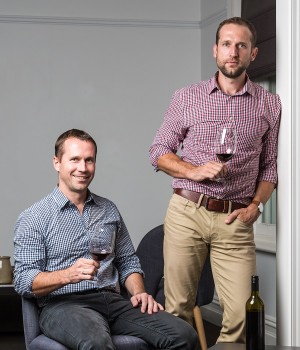South Australian start-up Vinnovate, the makers of a revolutionary new bottle closure for wine, water and other beverage containers, has been recognised as the best start-up idea in the Australian wine industry, winning the Brancott Estate Winexplorer innovation challenge and $35,000.
Brancott Estate and start-up accelerator, BlueChilli partnered to search for innovations that can impact the global wine industry through the Winexplorer challenge and the finalists were all formidable.
The global wine industry is estimated to be worth $303 billion annually, with South Australia accounting for nearly $2 billion of that in 2014-15.
What is Vinnovate’s vision?
Vinnovate founders, Barossa Valley brothers Simon and Joshua Schmidt say they’re excited that major wine labels are taking notice of the trend towards consumer customisation.
“In other industries, being able to customise beverages is becoming an expectation among consumers and, we believe this trend can positively impact how people enjoy and consume wine,” Joshua Schmidt says.
“With Vinnovate, our innovative new closure adds a functional element to wine packaging, allowing the consumer to tailor their wine to their own personal tastes, whether that’s to reduce the effects of preservatives in wine or to subtly change the flavour.
“We believe consumers should have a choice, and that’s something that makes our product unique.”
Vinnovate’s screwcap closure called the ‘Vino Cap’ has a built-in flavour chamber that you manually activate to add complementary flavours or aromas to your wine or reduce preservatives. This allows wine drinkers to tailor the flavour of their wine on-demand.
“We are working with the Australian Wine Research Institute to ensure everything we do is credible,” Joshua highlighted.
 What is the story behind Vinnovate?
What is the story behind Vinnovate?
Brothers Simon and Joshua Schmidt were born and raised in one of the worlds premier wine regions – the Barossa Valley. Simon, Managing Director was working as a professional winemaker, and is currently undertaking his MBA at the University of South Australia. Joshua, Chief Innovation Officer has primarily lived abroad since graduating with a Commerce degree and has worked in marketing, the investment banking sector and in the pharmaceutical space.
Joshua told Anthill that Simon was on vacation in Vietnam and amid a dinner discussion with a medical professional when he was asked, “Why do I get a physical reaction when I drink wine?” It’s the preservatives, he responded.
“This conversation was followed by a realisation that preservatives are redundant at point of consumption, and it was from that moment, with a technical and commercial winemaking knowledge base, that we set about establishing a way to give consumers the choice to remove preservatives before they consume wine.”
 Vinnovate was recently awarded seed funding through UniSA’s Venture Catalyst program and was a recipient of the South Australian Government Micro Finance Fund.
Vinnovate was recently awarded seed funding through UniSA’s Venture Catalyst program and was a recipient of the South Australian Government Micro Finance Fund.
“This grant funding which allowed us to work with an industrial designer, and a commercialisation coach, to work through design of the closure and how to make the product a reality,” Joshua says.
“Since that time, Vinnovate has continued to receive support from the South Australian government and the University of South Australia to develop our business and commercial opportunities for the innovation, which now extend far beyond just preservative removal in wine.”
“It’s the early days, but the companies and industry leaders we’ve been speaking to have been extremely positive about what we’re creating.”

It’s true, Vinnovate is getting lots of praise
Australian Master of Wine, Phil Reedman MW, says the new closure is a breakthrough.
“Vinnovate’s name sums it up: innovation in wine,” Mr Reedman says.
“Wine can be a pretty staid business but their solution, which allows consumers option to reduce preservatives in their product, offers a breakthrough innovation.”
UniSA Vice Chancellor Professor David Lloyd says the Schmidt brothers are genuine innovative thinkers.
“They have taken their knowledge of the wine industry, looked at the market and thought, what would be the next big thing to give customers some choices?” Prof Lloyd says.
“Then they have developed an innovation that not only solves a problem but that is truly elegant in its simplicity.
“This is the kind of grounded creativity that the state needs to drive new businesses and underpin new industries and we’ve been delighted to back them.”






![How Master the Art of Sales Even if it Makes You Feel All Weird and Icky Inside with Phil Anderson [CHEAT SHEET]](https://anthillonline.com/wp-content/uploads/2015/08/PHIL-ANDERSON-COVER-300x194.png)
![The Top 5 Most Insanely Dumb Mistakes made by Rookie and Seasoned LinkedIn Users, with David Hobson [FREE REPORT]](https://anthillonline.com/wp-content/uploads/2015/07/Screen-Shot-2015-11-26-at-14.29.18-100x75.png)
![How to expand into New Markets with Elsita Meyer-Brandt [CHEAT SHEET]](https://anthillonline.com/wp-content/uploads/2015/07/Screen-Shot-2015-11-26-at-15.52.30-100x75.png)
![How to give good headlines, and create emails that get opened [CHEAT SHEET]](https://anthillonline.com/wp-content/uploads/2013/11/7-steps-cheatsheet-3d-cover-nuova--100x75.png)
![Learn how to devise winning business ideas in four steps with Martin Martinez [CHEAT SHEET]](https://anthillonline.com/wp-content/uploads/2015/07/Screen-Shot-2015-11-26-at-13.44.27-100x75.png)
![How to build a retail empire with James Webber [FREE REPORT]](https://anthillonline.com/wp-content/uploads/2015/06/james-webber-instagram-memes-01-100x75.jpg)

![Steve Baxter on how to become a successful entrepreneur and what he looks for in a start-up before investing [VIDEO]](https://anthillonline.com/wp-content/uploads/2016/02/SteveBaxter10-1-300x350.jpg)
![Strategic Alliances with Simone Novello [FREE INFOGRAPHIC]](https://anthillonline.com/wp-content/uploads/2015/08/Capture6-300x194.jpg)
![How To Grow Your Business and Profits with Jason Cunningham [CHEAT SHEET]](https://anthillonline.com/wp-content/uploads/2015/07/Cunningham-100x75.png)
![Networking is for suckers… master Inbound Marketing [FREE REPORT]](https://anthillonline.com/wp-content/uploads/2015/03/inboundreloaded-100x75.png)
![How to zig when everyone else is zagging, with Julio De Laffitte [CHEAT SHEET]](https://anthillonline.com/wp-content/uploads/2015/08/Capture2-100x75.jpg)
![New Zealand’s Xero eyes US IPO, further disruption as subscribers increase [INFOGRAPHIC]](https://anthillonline.com/wp-content/uploads/2014/07/sruuuuujana-212x194.png)
![Ever wonder if your ‘content marketing’ is really just crap? You gotta see this! [INFOGRAPHIC]](https://anthillonline.com/wp-content/uploads/2014/08/content-100x75.jpg)
![7 Business Lessons From Game of Thrones [INFOGRAPHIC]](https://anthillonline.com/wp-content/uploads/2014/10/infographic-games-of-thrones-041-100x75.jpg)
![How to build your own Media Empire… In seven steps with Nathan Chan [INFOGRAPHIC]](https://anthillonline.com/wp-content/uploads/2014/10/Nathan-Chan-Infographic-e1413419529176-100x75.jpg)
![5 Business Lessons From Tinder [INFOGRAPHIC]](https://anthillonline.com/wp-content/uploads/2014/10/Tinder-Elegant-Infographic-100x75.jpg)



